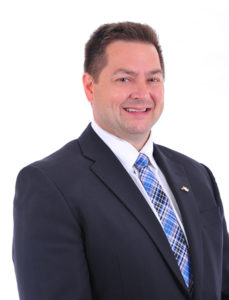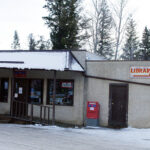Home »

Hard times in Mountains of Opportunity
Lead locally elected officials from all three levels of government came together in Cranbrook today (Jan. 19) to hear from exasperated business owners who have had enough of being steadily targeted by thieves, vandals and having to deal with the fallout of drug addiction.
 Ten business owners joined Kootenay-Columbia MP Rob Morrison, Kootenay East MLA Tom Shypitka, City of Cranbrook Mayor Lee Pratt and Coun. Wes Graham at Top Crop Garden, Farm and Pet in Cranbrook for a discussion about the increase in the crime, especially in the past two years.
Ten business owners joined Kootenay-Columbia MP Rob Morrison, Kootenay East MLA Tom Shypitka, City of Cranbrook Mayor Lee Pratt and Coun. Wes Graham at Top Crop Garden, Farm and Pet in Cranbrook for a discussion about the increase in the crime, especially in the past two years.
Each speaker made a connection to the increase in the city’s homeless population.
The purpose of the meeting, organized by MP Morrison’s office, was to allow all levels of government to hear more about the problems being experienced and to formulate a direction moving forward.
At the end of the hour-long discussion, the federal, provincial and city government leaders agreed to continue to meet and to work from their particular vantage points to try and find answers and a path forward.
Top Crop co-owner Shannon Fisher said crime has always “been a part of life” being a business owner “but the last two years have been absolutely horrific.”
She noted a lengthy list of violations that have occurred at the business, from security alarms going off every second night, all of its signage being taken and burned by people staying at a nearby homeless camp, along with furniture and personal items belonging to staff members being stolen. The fire department also made numerous visits to the business or near it to deal with fires.
Fisher pointed out a greenhouses on the property has natural gas and is filled with fertilizer. Should a fire be lit near or in it, “we’re going to take out a two-block radius.”
She told the gathering her business has spent tens of thousands of dollars in security from cameras to razor wire along the fence but activity continues.
“The expense we’ve gone through to protect ourselves and our staff, I mean, something has to change
Fisher also noted many of the homeless are being left high and dry.
“They’re not being supported, either. The system is failing them,” she said, adding it also isn’t homeless people committing all the crimes.
“And there are a lot of businesses going through way worse things than we’re going through.”
She also noted that as a Jaffray resident, she now often heads to Fernie to shop instead of Cranbrook.
“Because Cranbrook is sketchy. What’s this doing to business? People are not coming here because it is sketchy. That should terrify everybody.”
Cranbrook Chamber of Commerce Executive Director Helen Barron said they hear about problems from business owners but also experience them at the chamber office.
“We’ve had encampments down from us, we’ve had people try to break into our building one morning when our staff were there. We had the fire department come and pick up over 200 needles in one sitting. We had someone set up a little home beside our building and almost set our building on fire. It’s dangerous. We’re also afraid to be alone, especially in the summer months when there are more people out there.”
Barron said the chamber sent a letter to the city in late 2020 “about this problem because we were hearing about it almost daily and it’s just getting worse.”
The stresses from the pandemic combined with this issue is making some business owners contemplate leaving the city, she added.
“It’s a community issue, too. Everyone has a role to play in abating it,” she said, adding social support agencies must be provided “with the support they need to support the people who are struggling with mental health and addiction issues. It’s permeating every aspect of our community and it’s going to take all of us coming together and working to figure out a solution”
Seven other business owners shared their own experiences and concerns.
“It’s not the homeless we need to punish; it’s the repeat offenders who are using and abusing the system and not getting punished,” noted a sporting goods store owner, who said his business has experienced numerous violations.
“It’s becoming a scary place to live.”
Southeast Maintenance contractor Bill Graham shared a series of stories about what he observes while tending to parking lots around town and he’s noted an increase in activities the past two years, with drug abuse rampant.
Business owners from Kootenay Street, the Industrial Park, Cranbrook Street and elsewhere in the city all shared stories of being victimized by crime and vandalism, as well as having to try and deal with encroachments by the homeless – each noting concern for the safety of their staff and themselves, as well as heavy financial hits.
“It feels like a mini-Detroit,” said an industrial park business owner.
Downtown business owner Tammy said she hears from people outside the city who will go to Alberta or elsewhere in the East Kootenay to shop rather than come to Cranbrook “because it is sketchy.
“I depend on those people coming in because people in Cranbrook don’t support me, they go out of town. All the surrounding communities come into town. Now with all these people around, they won’t come in because it’s sketchy.”
Shannon, a downtown café owner, said some of her staff members are teenagers and she fears for their safety, whether from an aggressive person or drug paraphernalia, such as needles, left lying about.
“It makes me sick to think my staff could get hurt,” she said.
After hearing from the business owners, the elected officials shared their views.

Mayor Lee Pratt said the city is well aware of what is happening and pointed at B.C. Attorney General and Minister Responsible for Housing David Eby as someone responsible for the rise in homelessness and drug abuse in the province.
“I hear your frustrations and I’ve heard many more,” Pratt said.
BC Housing, with Eby’s backing, worked behind the city to establish a shelter at 209-16th Avenue North, with zoning approved by council in February 2021.
“And then we’re off to the races. Everyone knows there’s going to be a homeless shelter in Cranbrook; let’s go there! They know there is a reason for them to come here,” he said.
“And they get here and they find out they’re not going to get into the Travel Lodge because they don’t abide by the rules so they get kicked out. And these are the people who need the help. I am not against helping the homeless people but what I am against is helping drug addicts and mentally ill people continue their lifestyle and David Eby is the minister in charge of the legal system and he’s also in charge of BC Housing and what he’s done in his time is he’s taken the problem from the East End of Vancouver and he’s spread it throughout the province. And how does he do that? Through BC Housing. They buy up motels and hotels, they renovate them and put all these people in there. Now the problems are theirs. They give them drugs! I think the province is the biggest drug dealer in the country right now. And the drugs they’re given, they take them and sell them so they can get ‘the good stuff.’ Unfortunately, it’s laced with Fentanyl and that’s why we have an overdose problem.
“As far the city goes, let me tell you, we have not turned a blind eye to this. We’ve done everything we can.”
Pratt noted that some homeless camps had to be left alone in the past (not removed) because there was nowhere else for those people to go.
“When they brought the Travel Lodge in, then that was reason for us to go and dismantle these camps. The first one we dismantled took two dump trucks and a front-end loader and eight employees to haul the junk away and now there are more of them.
“I did a tour with the RCMP and went to five camps. It is disgusting what they collect and what they steal,” he said, reminding the gathering held a meeting last year with all social service agencies to “identify some gaps and I can tell you, the gaps are enormous.”
A temporary shelter is not the answer to help the homeless, Pratt continued.
“What we have to do – we have to go to the head – to the top, that’s where it’s going to start – with David Eby. We need to go back to institutions that when these people are picked up, they’re arrested and put in there and they get the help and the counselling they need so they can be contributors to society. Continuing to give them drugs and stuff life that is not helping at all.”

MLA Shypitka said he agrees with much of what Mayor Pratt said.
“This is a multi-layered problem. It’s not only mental health and addictions, but it’s housing and affordability. A lot of these people who are victimized or marginalized are sons and daughters and moms and dads. My brother died of addiction,” he said.
“I’m not here to point fingers. There are lot of things the province can do and the city can do. The provincial government, in my opinion, has dropped the ball huge on this. This is one of their cornerstones of promises made to British Columbians – mental health and addictions. They’re (NDP government) were very proud they set up the first Ministry of Mental Health and Addictions. They tooted really loudly that they were so proud of this ministry, yet this ministry’s budget has been cut. It’s a $6 million budget. It’s about one-third of the Premier’s Office budget. It’s just a façade,” Shypitka stated.
“This pack ‘em and stack ‘em mentality as I call it, where they warehouse people, it may look good on the outside where they’re finding someplace to live but there is no support. We are holding these people perpetually in a bad place,” he said, pointing out a homeless solution was achieved in 2017 via a shelter at the Salvation Army but the new NDP government killed it by demanding “harm reduction on site and Salvation Army said ‘we don’t roll that way.’
And because it wouldn’t allow drugs on site, the plan was denied by the province.
“That would have been a game-changer here,” he said, echoing the call for all levels of government to work in unison.
“This is where we start. I have a heart for these folks,” he said, sharing a story of a homeless person he met “who was just a regular person” who had his life spiral out of control into addiction.

MP Morrison said the federal government needs to step in with long-term solutions.
“It takes rehab and lots of rehab – years of rehab, actually, so that’s where the feds have to step in and start looking at long-term solutions,” he said.
“COVID-19, as a pandemic, will not be present long term, but our communities will be. For the long-term health of Canadian society we must begin the process of healing the divisions and addressing the problems this pandemic has brought to the surface. I believe this begins with a focus on mental health.
“Today we are talking about homelessness, drug abuse and the detrimental effects of uncontrolled crime. All levels of government are committed to working together to address the larger issues, however, in the short term, as we work to address, we cannot leave the staff of local businesses to shoulder the responsibility,” Morrison said.
“No one at Top Crop, or any other business, should be afraid to go to work. Staff collecting carelessly discarded needles should not be normalized and businesses should not be left to fix fences, replace stolen goods or damaged vehicles. Barbed wire fences in our communities must not be the solution.
“Over the coming weeks and months, I will work to bring together community leaders, businesses, the RCMP and those in the health community in an effort to address these escalating issues that our communities are facing, the MP concluded.
Lead image: Scattered remnants of a homeless camp on the edge of the industrial park last summer. The camp was just a few feet from the site of a fire that spread from an unattended fire during the peak of the hot fire season. e-KNOW file photos
By Ian Cobb/e-KNOW







